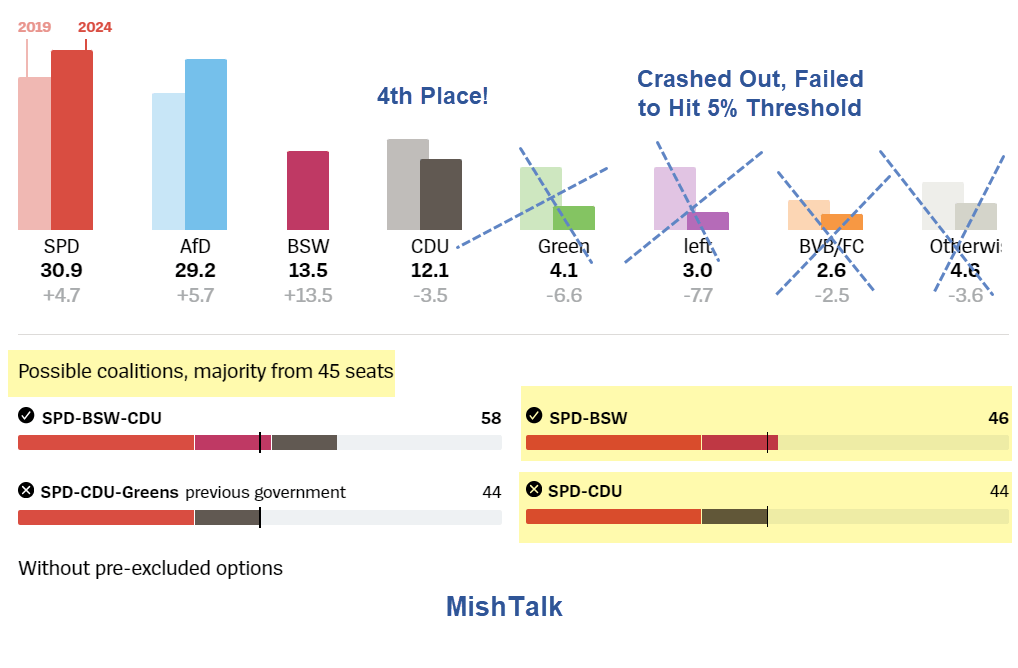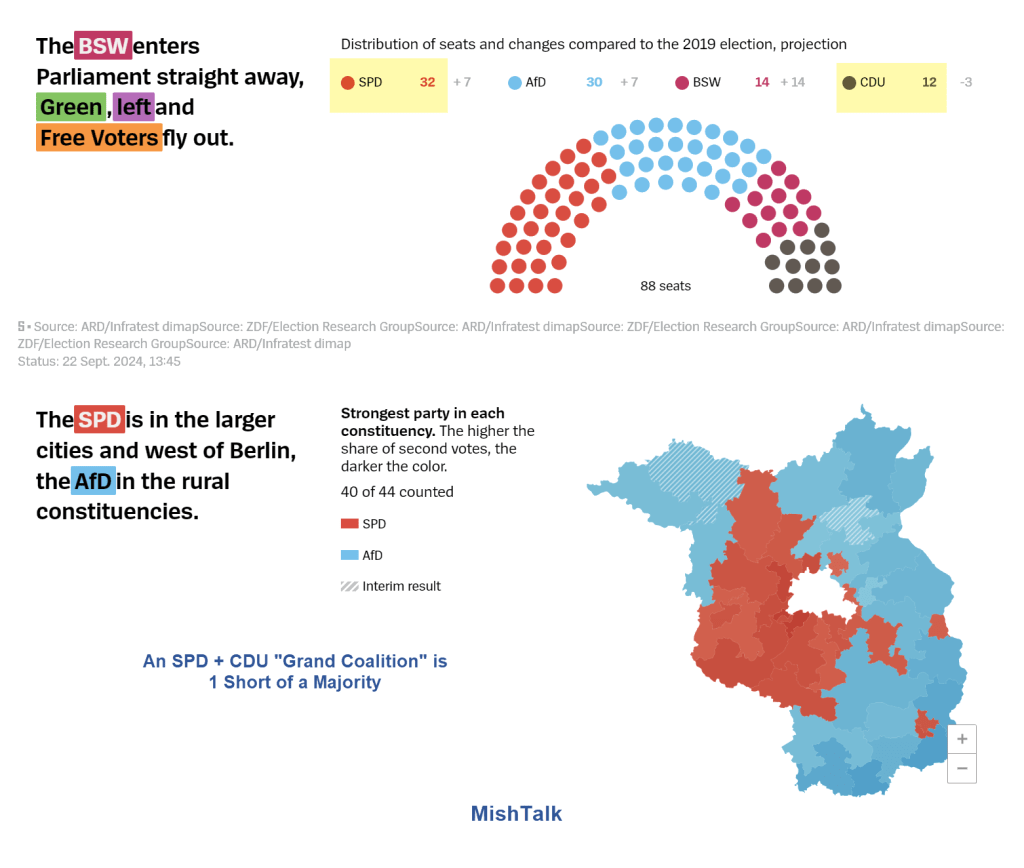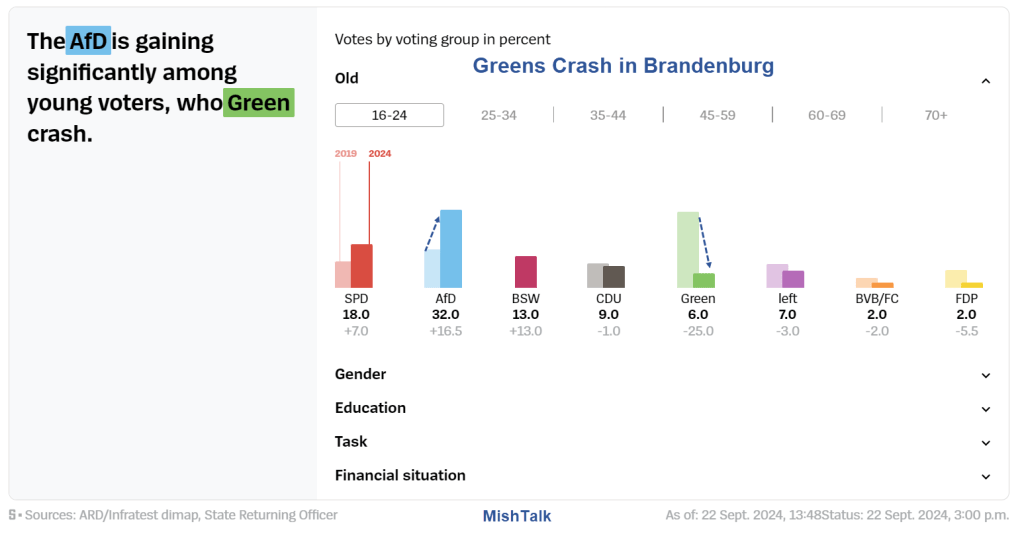It appears SPD + CDU will fall short of a coalition majority. Young voters abandoned the Greens en masse.

Brandenburg State Election 2024 Live Results
Der Spiegel has the most up-to-date Brandenburg State Election 2024 Live Results
I crunched some numbers in my previous post and thought SPD-CDU could barely form a coalition. That no longer appears to be the case.
In Germany, if parties fail to make a 5 percent threshold, they get generally get no representation. Those votes then get assigned on a percentage basis.
Greens and Die Linke Gone

What’s going on with the uncounted votes?
Greens Crash Out

Political Positions
SPD: The SPD’s core issue has always been social policy such as a minimum wage. The SPD aims to tax the rich while easing the tax burden on low and medium-earners. The party’s traditional voters — industrial workers and low-income earners — turned their backs on the SPD, and the party went through a protracted identity crisis as it teamed up with the conservatives for “grand coalition” governments, that were seen to dilute its image.
SPD’s preferred coalition partner is the Green Party. [Mish Note: Booted in Brandenberg and possibly nationally in the next election]
AfD: The AfD wants to prevent refugees from heading to Germany at all. The party wants to immediately deport anyone whose application for political asylum is rejected. The AfD wants to limit NATO’s operational area to the territory of its member states and replace the EU with a new organization.
The AfD was originally created by a group of neo-liberal academics as a protest against the single European currency. They were angered specifically by Merkel’s decision to bail out Greece in 2010 following Europe’s financial crisis. But following the influx of refugees mainly from war-torn Syria in 2015, the party set an overtly nationalist, anti-immigrant, anti-Islam agenda.
BSW: The Sarah Wagenknecht Alliance is left-wing on economic issues: social justice, job security, higher wages, generous benefits and a revamped tax system. It’s close to the far-right on issues like immigration and gender diversity. The BSW is critical of sending weapons to Ukraine and its supporters in the Russo-Ukrainian War, and blames NATO for escalating the conflict. In reference to the Israel–Hamas war, Wagenknecht described the Gaza Strip as an “open-air prison.” BSW opposes the shift toward renewable energy.
CDU: The CDU/CSU pledge to reduce corporate taxes and benefit high-income earners.
On migration, the CDU/CSU stresses its commitment to the fundamental right to asylum, but they want tighter restrictions on who can apply for asylum and they stress the need to deport refugees who have committed criminal offenses in Germany.
The CDU/CSU wants Germany to play a leading role in world affairs. They see Europe and the United States as Germany’s traditional partners.
CDU’s preferred coalition partner is FDP. [Mish Note: Booted in Brandenberg and likely nationally in the next election]
The above snips from DW’s A Look at Germany’s Political Parties.
Does Any Coalition Make Sense?
According to the website InfoMigrants, “the Social Democrats consider immigration an enrichment that advances Germany. They call for a humanitarian EU asylum system and solidarity with refugees and migrants.”
That is from 2023 but remains the general position. Since then, SPD has bent a little but the party remains lightyears apart from either BSW or AfD.
Factoring in preferred coalition partners, no coalition makes any sense. And all of the parties have ruled out a coalition with AfD.
Why would CDU want to enter another failed “Grand Coalition” even if the math worked?
Nonetheless, that could be the final result as a minority or bare majority election simply to keep AfD an BSW out of the picture.
The current Government is a three-way mess of SPD, CDU, and the Greens with only 44 seats, one short of majority.
SPD + BSW would hit a majority plus one, but the immigration and also green policies are lightyears apart.
Flashback January 22, 2024: Another Pro-Russia Political Party Emerges in Germany, Why That Matters
The German “Traffic Light” [SPD, FDP, Green] coalition has splintered beyond salvation. A new German party that aims to defy labels has emerged.
Curiously, Sarah Wagenknecht seeks to “defy labels” with a mix of left-leaning economic, conservative migration and pro-Russian foreign policy initiatives.
Certainly, she will have more luck with the no labels idea in Germany than the No Labels party in the US. Let’s take a closer look.
To go from 0 percent to 13.5 percent in less than a year is amazing.
Also see my September 1 post, Far Right to Win First German State Election Since WWII
AfD won the state election in Thuringia and came close in Saxony.
In Thuringia AfD got 22 seats, CDU got 21 seats, BSW got 15 seats, SPD got 6 seats, and the Left 12 seats with 45 seats needed for a majority. The Greens and FDP were wiped out.
Good luck with forming a coalition out of that. It does not look possible at all.
In Saxony, CDU got 41 seats, AfD 40 seats, and BSW 15 seats with 61 seats needed for a majority.
Germany Suspends Schengen, Immigration Repercussion Across the Entire EU
On September 10, I noted Germany Suspends Schengen, Immigration Repercussion Across the Entire EU
For the first time in EU history, Germany is at the forefront of immigration suspension. Other EU countries will follow.
Today’s result shows what happens when you suppress what voters want.